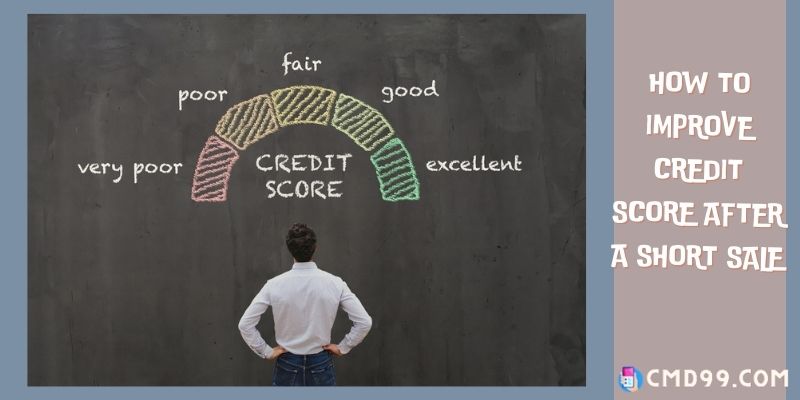During the Great Recession, when real estate values crashed like a coin dropped in a cup of water, many troubled property owners were forced to make the unfavorable option to sell their homes. Since short sales permitted you to re-enter the home market in just two years, they were a superior long-term option. You could live rent-free for a few months while the foreclosure process was going on thanks to foreclosure, which was a temporary solution. Let’s cmd99.com find out What Is a Short Sale and How to improve credit score after a short sale?
What Is a Short Sale?

How to improve credit score after a short sale If the lender permits it, you try to sell your house in a short sale for less money than you owe. The lender keeps the money if the house is sold. Short sales are not always approved by all lenders. In fact, for the lender to even entertain the concept, homeowners often need to be at least 90 days over due.
The remaining balance on the mortgage might not be waived by all lenders. A deficiency judgment, which requires you to pay the difference between the sale price and the outstanding mortgage balance, may be sought by lenders under the provisions of several state statutes.
The three main credit bureaus will get a short sale report from the lenders as a charge off, settlement, deed in lieu of foreclosure, or debt settled for less than the amount owed. The harm to your credit score might also be greatly affected by how the lenders report the short sale.
Your credit score may also be negatively impacted by any past-due mortgage payments you made prior to the sale. Finally, your credit will suffer if the lender wins a deficiency judgment to recover the remaining mortgage sum. Your credit score might also be impacted by the size of the deficit.
How Does a Short Sale Impact Your Credit

Your credit score will suffer after a short sale, declining by up to 150 points, depending on where you started. Your chances of falling are worse the better your credit score.
Rod Griffin serves as the director of public education for Experian, one of the three major credit reporting agencies in the United States. He declared: “Short sales are among the worst things that can happen to your credit score.”
It will probably have a very significant negative impact, Griffin continued. Depending on your credit history, the scoring algorithm being used, and the lending institution’s requirements, your score may drop by a specific amount.
Typically, credit ratings fall between 300 to 850. If your credit score is in the 750–800 range, a short sale might easily result in a 150–200 point decrease, possibly even more. If your credit score is in the 650–720 range and you have an average or even good credit score, a short sale could cause you to lose 100 points, placing you in the “subprime” group that lenders refer to.
Why is this crucial?Borrowing may become more challenging, if not impossible, with a low score. Your interest rate will increase when your credit score declines, even if you are still qualified for credit or loans How to improve credit score after a short sale.
How to improve credit score after a short sale

How to improve credit score after a short sale Even while both short sales and foreclosures can cause significant damage to a credit score, making mortgage payments up until the short sale’s closing date may provide a way to see your score quickly recover. As contrast to five to seven years following a foreclosure, you may frequently get a mortgage for a new home in two years, and even sooner if you kept paying your mortgage until it was sold.
Like foreclosures, short sales can stay on your credit report for up to seven years. The benefit of short sales is that, often after two years, your credit score will start to rise more quickly. However, there are steps you may take to quicken the process.
How to improve credit score after a short sale The most crucial action is to concentrate on your consumer credit. Keep your credit card balances low and make timely payments for all of your bills. Try to reduce your credit card debt if you have any since it affects 30% of your credit score. Try to open an account if you don’t have revolving credit for purchases. A secured credit card, which is offered by many lenders, allows you to put down a deposit to protect your card from the purchases you make. Your creditworthiness will increase if you make timely statement payments.
“If there is on-time repayment information reported on your accounts, that is a positive and will help offset the negative caused by a short sale,” Griffin stated.
How to improve credit score after a short sale Calling a nonprofit credit counseling organization might be helpful if you’re finding it difficult to balance all these options. There, counselors with experience in offering debt reduction services are available for free consultation.
Delinquency
How to improve credit score after a short sale Avoiding payment default is the best thing you can do before, during, and after a short sale. The longer a payment is past due, the more points are deducted from your credit score, according to calculations employed by credit reporting companies. Regaining those points will require time and continued, consistent payments in the future. The best way to get over this problem is to start making regular payments in the future.
In the end, short sales almost never improve your credit, but they do so less severely than bankruptcy or foreclosure. A short sale might only hinder you from receiving a mortgage on a new home for two years, as opposed to the seven to ten years that a foreclosure or bankruptcy could keep you off the market. Even if you need to wait two or longer years, it’s an opportunity to develop good money management skills that will improve your credit score, which might lead to a reduced mortgage rate the next time you buy a home.

